Undergraduate
Aditya Ganapathiraju
"I was really engaged in social psychology because of how profoundly social dynamics can affect peoples' behavior." - Aditya Ganapathiraju (BA, June 2010)
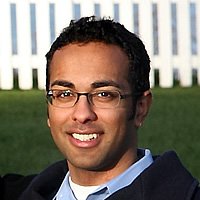 Aditya Ganapathiraju is a student of humanity. A double major with philosophy who is also completing minors in human rights and values, Aditya is interested not only in the individual, but in how the individual behaves in relation to and interacts with larger social groups. One of two psychology majors nominated for a Dean's Medal in Arts and Sciences, Aditya finds psychology to be a useful tool to examine the reasons behind people's behaviors. "Psychology is relevant to almost every aspect of life that concerns human behavior," he says, "so it seemed to me to be a fundamental subject to be studied."
Aditya Ganapathiraju is a student of humanity. A double major with philosophy who is also completing minors in human rights and values, Aditya is interested not only in the individual, but in how the individual behaves in relation to and interacts with larger social groups. One of two psychology majors nominated for a Dean's Medal in Arts and Sciences, Aditya finds psychology to be a useful tool to examine the reasons behind people's behaviors. "Psychology is relevant to almost every aspect of life that concerns human behavior," he says, "so it seemed to me to be a fundamental subject to be studied."
Prior to his arrival at UW in 2005, Aditya studied at Nassau Community College, in New York state. His move to Seattle, following a traumatic spinal cord injury in 2002, was to undergo rehabilitation therapy at UW Medical Center. Several months of introspection and self evaluation followed, as Aditya began to move forward with his life. As an undergraduate at UW, Aditya has taken advantage of a wide range of academic and extracurricular activities. A frequent contributor to The Daily student newspaper, Aditya has also been involved with the Student Disability Commission and serves as an officer for two politcal and social action student organizations.
In addition to his pursuit of two majors and two minors, Aditya has worked with psychology professor David Barash on a number of research and independent study projects. Dr. Barash, who has high praise for Aditya's scholarly commitments to peace and social justice, entrusted him with making suggestions for selections to be included in a book project. "I have been teaching at the UW since 1973," says Dr. Barash, "and can say unequivocally that Aditya is the most remarkable, accomplished and promising undergraduate student I have encountered during the ensuing 37 years!" In turn, Aditya points to Dr. Barash and the courses he teaches as "little known treasures" on campus. Both Dr. Barash and psychology professor Cheryl Kaiser top Aditya's list of 'not to be missed' instructors at UW.
For Aditya, the ability to synthesize his personal experiences with the knowledge that he has gained about human behavior and social interactions will guide him in future endeavors and inform the choices he makes. Ideally, a next step will be a research position with the Rehab Medicine unit that was his first 'home' in Seattle. There, he will no doubt bring to bear his knowledge of and passion for the interface between psychology and philosphy, the fruits of this truly interdisciplinary study of humanity.
Joy Kawamura
"Be proactive in discovering your genuine passion." - Joy Kawamura (BS, June 2010)
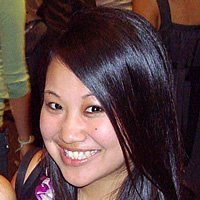 For Joy Kawamura, that passion began with a desire to work with children, and eventually inspired her psychology honors thesis, Parenting Stress and Child Adjustment in Acute Lymphocytic Leukemia Survivors: The Mediating Role of Parenting Behaviors. Joy will continue to pursue pediatric cancer research as a graduate student in the UW Child Clinical psychology graduate program.
For Joy Kawamura, that passion began with a desire to work with children, and eventually inspired her psychology honors thesis, Parenting Stress and Child Adjustment in Acute Lymphocytic Leukemia Survivors: The Mediating Role of Parenting Behaviors. Joy will continue to pursue pediatric cancer research as a graduate student in the UW Child Clinical psychology graduate program.
A native of Hawaii, Joy came to UW where she found a major in psychology to be the perfect way to integrate her interests. "I chose psychology as a major because I have always been fascinated by the ways in which people think, interact, and deal with challenges in life," recalls Joy. By complementing her academic studies with hands-on research and field experiences, Joy's interests began to gel into a focus on working with critically ill children and their families.
Throughout most of her undergraduate career, Joy participated in child development and child clinical research, with psychology professors Stephanie Carlson and Lynn Fainsilber Katz. She will continue her graduate studies with Dr. Katz, who has served as the faculty sponsor for Joy's honors research. Joy gained extensive and varied experience working with children as a tutor at Laurelhurst Elementary School through UW's Pipeline Project, and as an Inpatient Psychiatric Unit intern at Seattle Children's Hospital. Perhaps her most rewarding field experience came via two summer internships at the Kapiolani Medical Center for Women and Children, in Honolulu. "Through these internships," says Joy, "I worked with pediatric cancer patients and their families and was instantly captured by the amazing spirit of this population."
Proactive, passionate, and with a clear gift for working with a unique population, Joy stands ready for the exciting road ahead.
Lorin Dole
"I think I pursued psychology out of curiosity. I've heard lots of people say (somewhat) jokingly that people become psychology majors to try to figure themselves out. Maybe that was my motivation." - Lorin Dole (BS, June 2010)
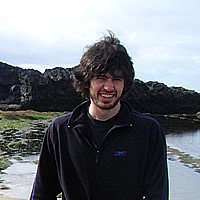 While Lorin Dole may have embarked on his study of psychology with a broad based curiosity and the intention to learn more about himself, he is poised to leave UW with more than he'd likely imagined possible. A member of the psychology honors program whose first university research experience involved creating an online survey as an assignment for a biological anthropology class, Lorin is set to begin a Ph.D. program at Stanford University this fall. He'll be part of Clifford Nass' Communication Between Humans and Interactive Media (CHIMe) lab.
While Lorin Dole may have embarked on his study of psychology with a broad based curiosity and the intention to learn more about himself, he is poised to leave UW with more than he'd likely imagined possible. A member of the psychology honors program whose first university research experience involved creating an online survey as an assignment for a biological anthropology class, Lorin is set to begin a Ph.D. program at Stanford University this fall. He'll be part of Clifford Nass' Communication Between Humans and Interactive Media (CHIMe) lab.
At Stanford, Lorin will continue in the field of research, human-robot interaction (HRI), that he began to study here with psychology professor Peter Kahn. His work with Dr. Kahn's Human Interaction with Nature and Technological Systems (HINTS) lab led Lorin look at questions in an interdisciplinary way, seeking out classes in fields such as sociology, statistics, and philosophy. "The HRI community is comprised of not only psychologists but also computer scientists, roboticists, ethicists, designers, and more," says Lorin, "and, it's growing."
Thinking about words of wisdom to share with new psychology majors, the outgoing president of the UW chapter of Psi Chi (national psychology honor society) gives a shout out to psychology lecturer Laura Little and encourages students to take statistics seriously. As most researchers, not just those in psychology, report their findings statistically, Lorin notes that a strong grasp of stats will give students a leg up in nearly all of their classes. "Being able to understand what researchers' numbers are saying," says Lorin, "and being able to replicate, augment, or manipulate the methods used to produce those numbers, is critical."
For Lorin, who leaves UW with a BS in psychology, a philosophy minor, a strong record of research and service, the numbers add up to a fully funded Stanford Ph.D. program and what promises to be a very bright future.
Spencer Coates
"Psychology has taught me to be skeptical without being cynical, understanding without being all-knowing, and intellectually flexible without being ungrounded."- Spencer Coates (BS, June 2010)
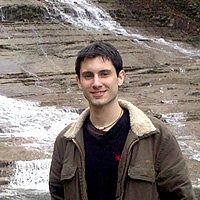 Spencer Coates is reflective. Reflective in his self analysis, as well as in both the nature of psychology as a discipline and in his choice of psychology as a major. With an initial exposure to the subjects of heuristics and biases in his Psychology 101 class, Spencer began to look to psychology as a lens through which to study human reasoning and decision making. "I had always been interested in logical fallacies and the seeming irrationalities of human reasoning," says Spencer, continuing that "after being a bit unsatisfied with the answers economics and philosophy were giving me, I found psychology to be the field where the most intellectually rigorous approach was taken to studying the intricacies of human judgment."
Spencer Coates is reflective. Reflective in his self analysis, as well as in both the nature of psychology as a discipline and in his choice of psychology as a major. With an initial exposure to the subjects of heuristics and biases in his Psychology 101 class, Spencer began to look to psychology as a lens through which to study human reasoning and decision making. "I had always been interested in logical fallacies and the seeming irrationalities of human reasoning," says Spencer, continuing that "after being a bit unsatisfied with the answers economics and philosophy were giving me, I found psychology to be the field where the most intellectually rigorous approach was taken to studying the intricacies of human judgment."
“Intellectual rigor” certainly comes to mind when thinking about Spencer Coates' undergraduate academic career. Clearly not one to shy away from a challenge, this long distance runner – who is set to run his first 100-mile race this summer – is completing the psychology honors program under the guidance of professor John Miyamoto, as well as a second major in math and a minor in law, societies and justice.
One of two psychology majors nominated for the prestigious Dean's Medal in Arts and Sciences, Spencer notes that he has tried to use psychology to some extent in all of his extracurricular activities. “My knowledge of human reasoning has helped me immensely in my career as a collegiate debater, and my studies in developmental and cognitive psychology have aided me in my efforts as a math tutor to elementary and high school students.”
Spencer urges new psych majors to take advantage of the wide range of resources available to students at UW. Emphasizing the University's world renowned faculty and cutting edge research, Spencer offers a simple piece of advice: be nice to your professors and you just might learn something.
Now, poised to begin law school at the University of Pennsylvania this fall, Spencer pauses for one last reflection on his decision to study psychology. "In the end, I have realized the simple beauty of our approach: many psychologists may end their career without answers to life's biggest questions, but if the best we can do is to achieve a verifiable set of fragments of insight into the human condition, then I would call our field a successful one."
Ahlehm Negash
"I chose psychology as my major because I felt it would make me a more effective educator and advocate for children facing academic challenges." - Ahlehm Negash (BA, December 2009)
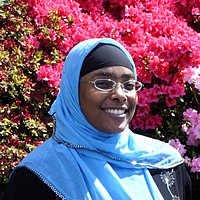 Already an experienced educator when she arrived at UW in autumn of 2008, Ahlehm Negash brought with her a desire to combine that experience with a strong academic foundation. A transfer student from California community colleges who was home schooled by her mother, Ahlehm has also lived, studied and worked abroad.
Already an experienced educator when she arrived at UW in autumn of 2008, Ahlehm Negash brought with her a desire to combine that experience with a strong academic foundation. A transfer student from California community colleges who was home schooled by her mother, Ahlehm has also lived, studied and worked abroad.
This international student and educator stresses the importance of being open to new ideas and ways of thinking, while at the same time remaining true to one's individual beliefs and values. No small task, but one that Ahlehm is up to. "My work as a teacher in the United States, Africa and Asia has afforded me the opportunity to observe human behavior across cultures and socioeconomic statuses," says Ahlehm.
Ever the teacher, Ahlehm brought her natural talents to bear as a peer teaching assistant. She worked with psychology professor Beth Kerr in her Fundamentals of Psychological Research class, holding office hours for the students and running study and review sessions. One benefit of being a peer teaching assistant is the opportunity that it affords the student to work one on one with a professor. "My advice to new psychology majors," says Ahlehm, "is to partner with your professors in your education - the acquisition of knowledge is an active process!"
Ahlehm's short term plans include pursuing a Master's degree in school psychology with an eye toward that ultimate goal of becoming a strong "educator and advocate" for children who are struggling under difficult circumstances. Ahlehm plans to realize that goal by one day opening a residential school for refugee and orphaned children in Africa.
Awards and Accomplishments
Congratulations to our Outstanding Students!
Psychology Honors Program
On June 2, 22 of psychology honors students presented their research to faculty, staff, and their peers in a poster session. Take a look at the poster session program to learn more about the students and their work.
McNair Scholars
The Ronald E. McNair Program prepares undergraduates for doctoral study through involvement in research and scholarly activities. The 2009-10 McNair Scholars from Psychology are:
- Safia Farole
- Albert Han
- Kiara Roberts
Spencer Coates (BS, June 2010), and Aditya Ganapathiraju (BA, June 2010), were nominated by the Department for the Arts and Sciences Dean's Medal in the natural sciences. Read more about Spencer, Aditya, and four other graduating psychology majors here. Mary Gates Research Scholars
Mary Gates Research Scholars
These students were 2009-10 recipients of Research awards from the Mary Gates Endowment:
- Kellen Andrilenas
- Annie Collins
- Erin Harrop
- Ines Jurcevic
- Joshua Newson
- Yuet Juhn Tse
Joshua Newson and Hillary Robbins received College of Arts and Sciences Undergraduate Research Awards. Joshua's faculty advisor is Sapna Cheryan and Hillary's advisor is Lynn Fainsilber Katz.
 Phi Beta Kappa
Phi Beta Kappa
The following undergraduate psychology majors were invited to join Phi Beta Kappa. Invitation is based upon the students' excellent academic record and interest in the liberal arts. The students are:
- Chloe Angus-Tibbetts
- Marie Curatolo
- Kendra Dale
- Mikaela Gomes
- Lauren Hudson
- Colin Johnston
- Hsueh Lu
- Mckinsey Nielsen
- Franz Ruijters
- Eric Siebert
- Christine Sulc
- Maria Sunseri
- Yuet Juhn Tse
- Gregory Wyant III
- Christopher Wyszynski

